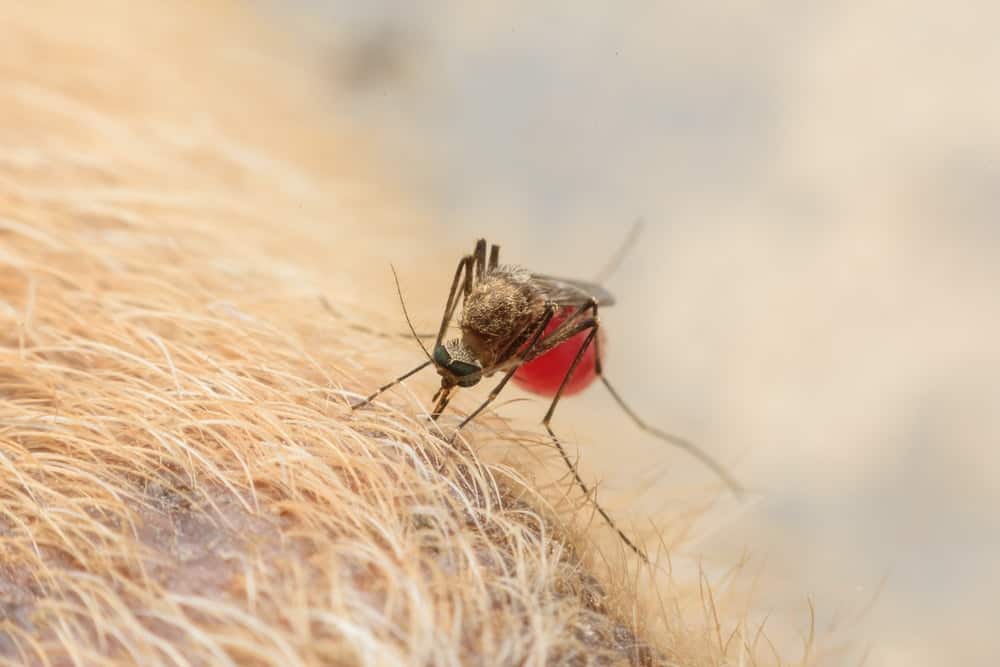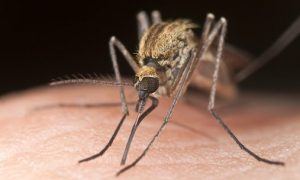“This post contains affiliate links, and I will be compensated if you make a purchase after clicking on my links.”
For many of us and our pets, warmer weather means it’s time to get out and have fun. Unfortunately, a hazard lies ahead for the four-legged adventurer. A single mosquito bite can lead to serious health complications in even the healthiest of dogs.

Understanding the dangers and taking preventative measures against mosquitoes and the risks associated with them is absolutely essential for a long, happy, healthy life for your dog.
How Dangerous Are Mosquito Bites, Really?
Could a tiny, pesky little bug really be that big a problem? Absolutely! In fact, one of the most common, yet totally preventable, diseases dogs suffer from can be caused by a single mosquito bite.
- Heartworms. One of the most serious (and most common) diseases that can be transmitted by mosquito bites to dogs is heartworm. A single bite from an infected mosquito is all it takes to infect your dog. Once this potentially deadly parasite is inside your pooch, the heartworm larva will flow into his bloodstream and, as they mature, will start clogging up your dog’s heart, lungs, and blood vessels. Adult worms can grow up to a foot in length, can live up to 7 years, and a dog can have as many as 250 heartworms in its system at one time. What’s more, heartworm disease affects dogs in all 50 states, so heartworm prevention, no matter where you live is absolutely vital.
- West Nile Virus. Although this health problem has a more serious impact on people, it seems to cause mild effects in dogs, too. Dogs that contract West Nile Virus through mosquito bites are likely to develop fever or become lethargic but usually don’t become gravely ill.
Note: Additional, yet rare, mosquito-borne illnesses that can affect dogs include Eastern Equine Encephalitis (EEE) and Systemic Lupus Erythematosus (SLE). It has not yet been determined whether the Zika Virus affects dogs, but it has been shown to be carried and transmitted by other animals including primates and rodents.
- Allergies and Infections. Despite the fact that mosquito bites normally result in localized skin irritation in dogs, severe cases of such, however, can lead to vomiting, diarrhea, lethargy, and other common systemic health complications. If a dog excessively scratches, chews, or licks at even a single itchy mosquito bite, this can quickly lead to hot spots or even infection. Left untreated, infections can spread to your dog’s blood and eventually lead to organ damage.

So, How Can I Best Protect My Dog?
Since prevention is the best way for you to keep Fido from these irksome insects, use the following guidelines to minimize risk and reduce exposure:
- Get rid of any stagnant water in your yard. Check for areas of standing water where mosquitoes breed, including buckets, dog bowls, tarps or umbrellas that may have collected rainwater, leaky irrigation systems, and anywhere else that water can collect and stand.
- Consider growing plants that naturally repel mosquitoes. Not only are they beautiful, these plants give off a distinct odor that naturally keeps mosquitoes and other pesks at bay. Some such plants (that are totally safe for dogs) include Lemongrass, Lavender, Catnip, Rosemary, and Mint. Unfortunately, while Citronella is great at naturally keeping mosquitoes away, the plant is toxic to dogs and should be kept well out of reach. Check out this article: 6 Dog-Safe Plants that Naturally Repel Mosquitoes (And other Pests!)
- Use dog-safe insect repellents. There are a variety of dog-safe mosquito repellents available in the form of sprays, wipes, and lotions that can effectively keep the tiny winged bloodsuckers at bay. Never, ever, use insect repellents made for humans as they can be toxic to your dog.
- Use dog products designed to repel mosquitoes. New to market is a huge collection of essential dog products made with a dog-safe, insect repelling material called InsectShield. InsectShield dog beds, blankets, and raised cots give your dog a comfy spot outside to rest while safely shielded from mosquitoes. Or, outfit your pup with an InsectShield bandana, t-shirt, or hoodie to keep pests away on the go. Best of all, they’ll protect you and your dog at the same time.
- Keep doors and windows closed when mosquitoes are in season. If you prefer the feel of fresh air from open windows and doors, install window and door screens to keep mosquitoes from entering the home.
- Keep your dog indoors as much as possible. This is especially important in the early morning and early evening when mosquitoes are at their most active.
- Use a heartworm preventative. Because heartworm disease is so prevalent, every dog should be protected with a monthly heartworm preventative. Remember, preventing heartworms is easy and inexpensive while treating heartworm disease is very costly and very hard on your dog.
How do you protect your pets against mosquitos? Please, share your favorite tips in a comment below.


















